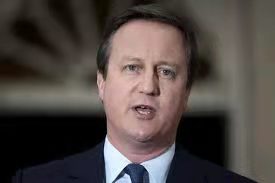



第13节
They see treaty after treaty changing the balance between member states and the EU. And note they were never given a say.
They've had referendums promised – but not delivered. They see what has happened to the euro. And they note that many of our political and business leaders urged Britain to join at the time.
And they haven't noticed many expressions of contrition.
And they look at the steps the eurozone is taking and wonder what deeper integration for the eurozone will mean for a country which is not going to join the euro.
The result is that democratic consent for the EU in Britain is now wafer-thin.
Some people say that to point this out is irresponsible, creates uncertainty for business and puts a question mark over Britain's place in the European Union.
But the question mark is already there and ignoring it won't make it go away.
In fact, quite the reverse. Those who refuse to contemplate consulting the British people, would in my view make more likely our eventual exit.
Simply asking the British people to carry on accepting a European settlement over which they have had little choice is a path to ensuring that when the question is finally put – and at some stage it will have to be – it is much more likely that the British people will reject the EU.
That is why I am in favor of a referendum. I believe in confronting this issue – shaping it, leading the debate. Not simply hoping a difficult situation will go away.
Some argue that the solution is therefore to hold a straight in-out referendum now.
I understand the impatience of wanting to make that choice immediately.
But I don't believe that to make a decision at this moment is the right way forward, either for Britain or for Europe as a whole.
第14节
A vote today between the status quo and leaving would be an entirely false choice.
Now – while the EU is in flux, and when we don't know what the future holds and what sort of EU will emerge from this crisis – is not the right time to make such a momentous decision about the future of our country.
It is wrong to ask people whether to stay or go before we have had a chance to put the relationship right.
How can we sensibly answer the question "in or out" without being able to answer the most basic question: "What is it exactly that we are choosing to be in or out of?"
The European Union that emerges from the eurozone crisis is going to be a very different body. It will be transformed perhaps beyond recognition by the measures needed to save the eurozone.
We need to allow some time for that to happen – and help to shape the future of the European Union, so that when the choice comes it will be a real one.
A real choice between leaving or being part of a new settlement in which Britain shapes and respects the rules of the single market but is protected by fair safeguards, and free of the spurious regulation which damages Europe's competitiveness.
A choice between leaving or being part of a new settlement in which Britain is at the forefront of collective action on issues like foreign policy and trade and where we leave the door firmly open to new members.
A new settlement subject to the democratic legitimacy and accountability of national parliaments where member states combine in flexible co-operation, respecting national differences not always trying to eliminate them and in which we have proved that some powers can in fact be returned to member states.
In other words, a settlement which would be entirely in keeping with the mission for an updated European Union I have described today. More flexible, more adaptable, more open – fit for the challenges of the modern age.
第15节
And to those who say a new settlement can't be negotiated, I would say listen to the views of other parties in other European countries arguing for powers to flow back to European states.
And look too at what we have achieved already. Ending Britain's obligation to bail out eurozone members. Keeping Britain out of the fiscal compact. Launching a process to return some existing justice and home affairs powers. Securing protections on banking union. And reforming fisheries policy.
So we are starting to shape the reforms we need now. Some will not require treaty change.
But I agree too with what President Barroso and others have said. At some stage in the next few years the EU will need to agree on treaty change to make the changes needed for the long-term future of the euro and to entrench the diverse, competitive, democratically accountable Europe that we seek.
I believe the best way to do this will be in a new treaty so I add my voice to those who are already calling for this.
My strong preference is to enact these changes for the entire EU, not just for Britain.
But if there is no appetite for a new treaty for us all then of course Britain should be ready to address the changes we need in a negotiation with our European partners.
The next Conservative manifesto in 2015 will ask for a mandate from the British people for a Conservative government to negotiate a new settlement with our European partners in the next parliament.
It will be a relationship with the single market at its heart.
And when we have negotiated that new settlement, we will give the British people a referendum with a very simple in or out choice. To stay in the EU on these new terms, or come out altogether.
【关联阅读】
温馨提示:横线象征链接。点击横线,直通链接。
 |
 |
|
学 习 辅 导 |
咨 询 热 线 |